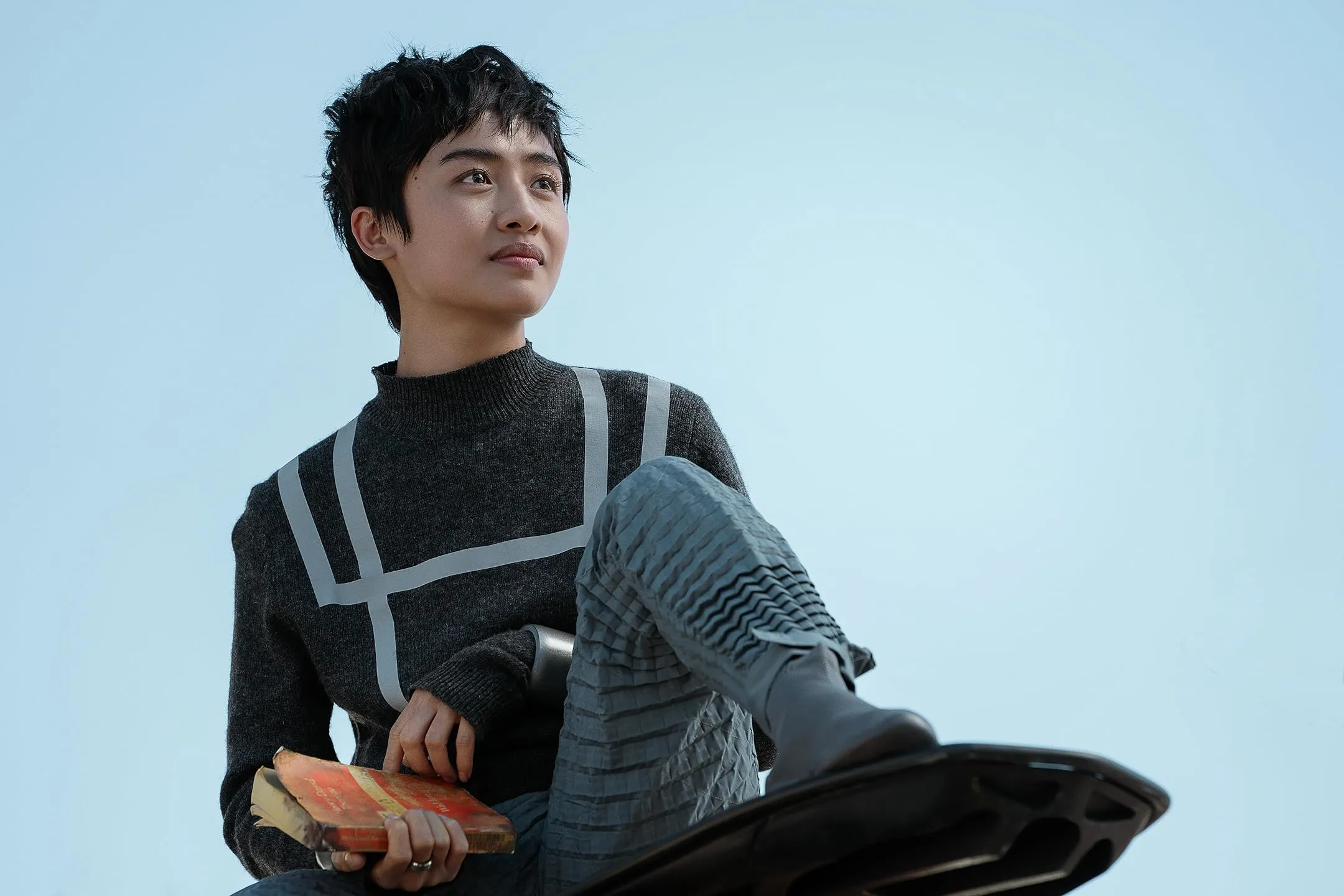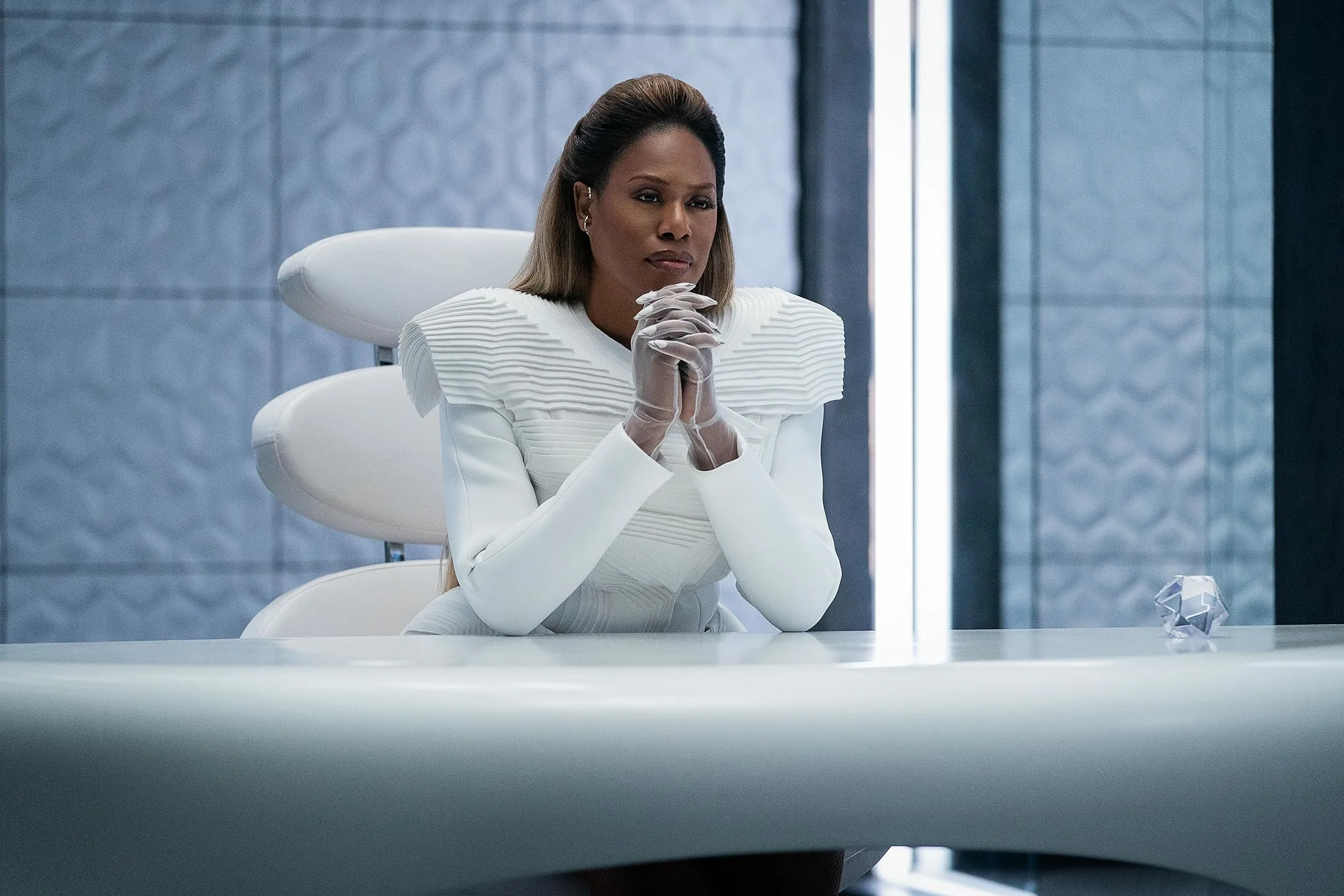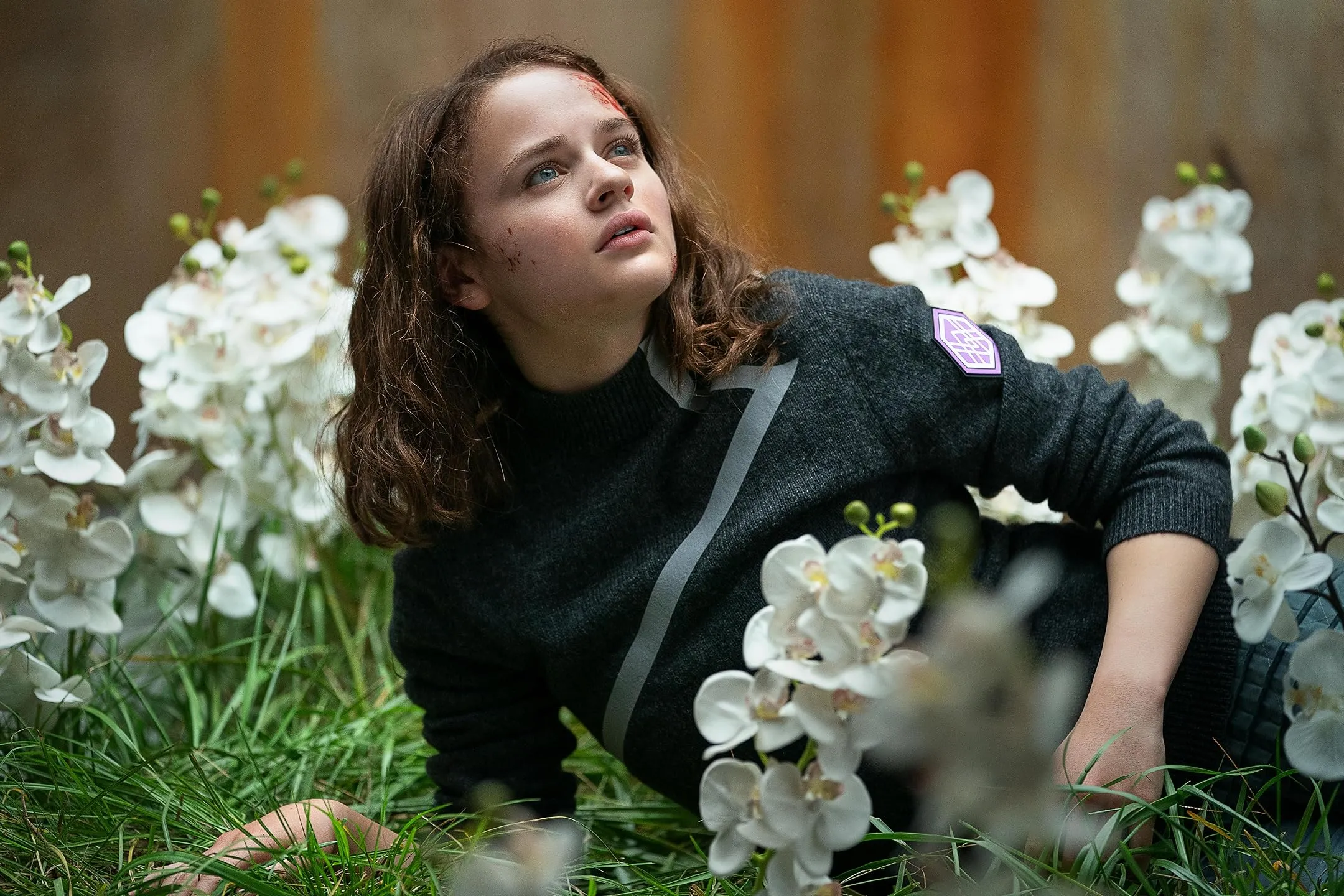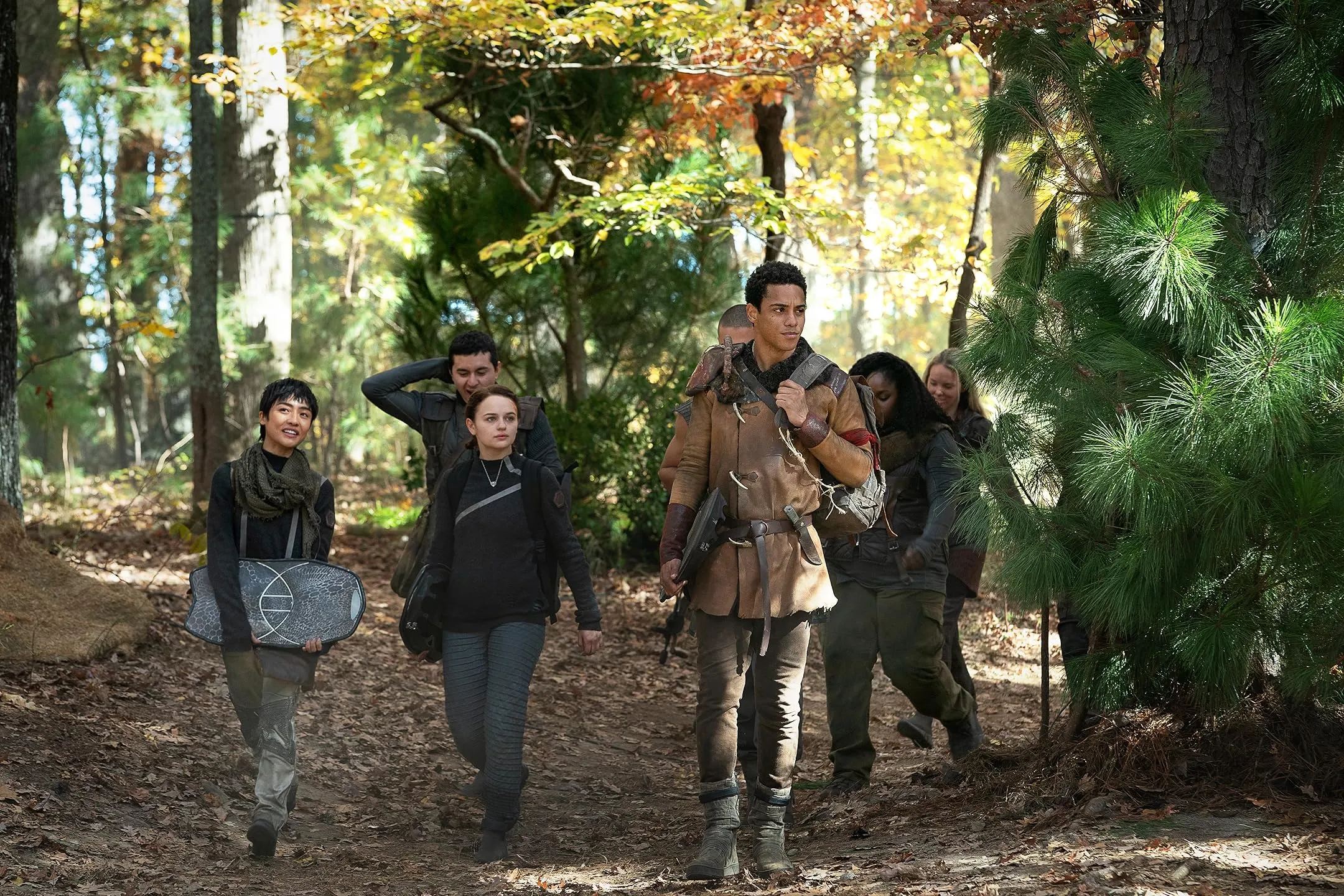Set in a futuristic world, Uglies explores compelling themes of identity, individuality, and questioning what society tells us. As 16-year-old Tally approaches her mandatory surgery to become a “Pretty,” she starts to reconsider what that label truly means.
The story takes place hundreds of years after fossil fuel dependence caused global collapse. Now everyone gets cosmetic surgery on their 16th birthday, supposedly eliminating discrimination. But when Tally’s friend Peris transforms and rejects her, and fellow “Ugly” Shay plans to escape this system, Tally begins to wonder if there’s more to how this society works.
Directed by McG, this 2005 novel adaptation had potential to spark thought. Futuristic details from holograms to hoverboards could have dazzled. Yet the execution falls flat. Heavy CGI drains set pieces of any magic, and an over-reliance on exposition hinders emotional investment. Predictable plot points barely explore the interesting themes.
Joey King drives the narrative as Tally but faces an uphill task with this material. Laverne Cox stands out amid forgettable supporting roles. While the premise intrigues, Uglies fails to use its dystopian framework for meaningful commentary. It remains at a at a surface level where deeper issues could have emerged. Fans of the books may find something to enjoy, but casual viewers will find little reason to remember this missed opportunity for movie magic.
A Tour of Uglies’ Futuristic Vision
Fans of Westerfeld’s novels have long envisioned how his futuristic world might come to life on screen. Uglies certainly delivers shiny technological touches like holograms and hoverboards meant to dazzle. Yet for many, the execution ultimately feels lacking.
Let’s start in New Pretty Town, where Tally gazes at digitized makeover options through a finger interface. It’s an engaging concept that McG struggles to make convincing. The city itself also provides a colorful playground for set pieces. However, heavy CGI lends an artificial sheen, resembling not a living metropolis but a sterile virtual world. Choreographed hoverboard scenes feel stiff rather than exhilarating.
Things improve slightly. Outside, where drab concrete introduces the Uglies. Yet even their dystopian compound lacks grit, resembling a bland videogame level. Costumes mirror this tone—uglies dressed not in dreary prison grays but plain everyday clothes. Pretties fair worse, looking less glamorously modified than slapped with an abnormal Snapchat lens.
The film really comes alive in The Smoke. Natural creekside cottages provide a tangible escape, while David’s people appear a true community rather than props. But it’s too late—viewers spent too long disengaged from plastic backdrops.
Comparisons further expose flaws. The Hunger Games crafted nuanced Panem districts with care, enveloping audiences. Yet for all its concepts, Uglies’ vision feels shallow and insubstantial, prioritizing flashy technology over grounded worldbuilding. Like Tally reimagining her unseen future, viewers struggle to become invested in outlines alone.
With stronger production values elevating Westerfeld’s vision, Uglies’ visuals may have captivated. But an overreliance on CGI risks reducing magnificent concepts to lifeless digital outlines, leaving fans and newcomers alike viewing through a distracting virtual lens.
Beauty Beyond the Surface
On paper, Uglies touches on thought-provoking ideas around individuality and questioning social conditioning. But does the movie do these concepts justice?
The world where everyone undergoes cosmetic surgery to conform raises interesting questions about beauty standards and what truly binds a community. Yet the film remains surface-level. With distractingly gorgeous stars as “Uglies,” it challenges no preconceptions.
Messages around brainwashing also fall flat. While the narrative treats the surgeries as empowering, clues hint at a darker reality. But these threads are hastily tied up rather than explored with nuance.
Opportunities exist to examine how societal control persists through different generations or critically mirror issues like the emphasis on physical perfection in social media. But Uglies presents no unfiltered mirrors, preferring simplicity over stimulating real thought.
Relevant themes feel like an afterthought, lacking the focus to resonate meaningfully. Stylized futures often reflect on today, but this world builds little beyond flashy aesthetics.
Joey King hints at Tally’s awakening, seemingly poised to scrutinize her indoctrination. Yet her epiphany arrives too easily, cursorily tidying themes of nonconformity rather than stirring substantive discussion.
Potentially rich material goes unexamined. While adolescents may find accessible conversation starters, the film fails to probe beneath surfaces in a way that engages intellectually curious viewers. Uglies paints a shallow portrait where depth could have taken root.
Fully Formed Characters or Flawed Facades?
In a dystopian world, compelling characters prove integral to any narrative. Does Uglies craft multi-dimensional personalities to engage viewers?
Tally, our heroine seeking individuality, falls flat. Joey King tries valiantly, but the part feels beneath her talents. Her arc progresses too predictably.
As her childhood friend turned drone, Chase Stokes injects little charm as Peris. His about-face conversion lacks grounded motivation.
Brianne Tju stands out as the rebellious Shey. She conveys complex emotion and intrigue, and her subplot feels most fleshed out.
Laverne Cox commands attention as the villainous Dr. Cable, though the part proves one-note. A more nuanced menace could have elevated stakes.
As love interest David, Keith Powers shows promise, but the character remains an enigma. Underdeveloped characterizations challenge investment.
Valid issues arise around 31-year-old Stokes. Playing a teen. Questionable casting choices undermine verisimilitude.
Supporting roles serve plot rather than develop human qualities. Tales thrive on fully realized personalities over hollow conduits for exposition.
Potential for layered character studies goes untapped. While the novel likely provided richer sources, the film fails to craft multidimensional characters to parallel its ambitious themes. When personas prove shallow, so too does any commentary attempted.
A Rushed, Predictable Journey
With a potentially thought-provoking premise, Uglies’ quest to ignite intrigue ultimately stumbles due to a rushed, formulaic execution.
The three-act structure provides a reasonable skeleton, but each section feels hastily sketched. Exposition bombards upfront, neglecting opportunities to peel back layers intriguingly.
Once the stage is set, plot points promptly tick listically. Tally befriends Shey, loses Peris, and joins the Smoke—all progressing at throttle’s end towards the inevitable conclusion. Character motivations flip on a dime to serve pacing over believability.
Action scenes lack finesse to match set pieces’ digital sheen. Moments meant to startle instead elicit puzzled shrugs at their expedited, nonsensical nature.
Subtle mysteries like David’s or Dr. Cable’s murky aims remain untouched. Logic gaps yawn regarding transplants’ abilities or city life. Loose threads outnumber satisfying ties.
While dystopian journeys inherently barrel forward, Uglies’ rush risks disengagement. Breathers to flesh out this rich world feel absent, stifling potential complexities. Viewers struggle to invest in characters navigating clunky, impatient twists.
With patience to unravel mysteries gradually, Uglies may have balanced clarity and intrigue. Alas, this storytelling equivalent of a sugar rush leaves audiences wanting more substantive nourishment to linger on.
Guiding Uglies Astray
McG takes the reins of Uglies’ cinematic transition but struggles to bring Westerfeld’s concepts to life. While dystopian worlds demand skilled architects, this future feels engineered, not organic.
Technical prowess exists—flashy imagery pops and sequences zip. But an overreliance on flash drowns potential chills. Scenes zoom by lacking atmosphere.
The score skims tension’s surface, failing to embed emotional depth. Detached notes lack synchronicity with emotions rarely felt fully.
Uglies’ kernels of thought on individualism and social control go unrealized. A missed chance to ponder big ideas through a resonant lens.
For fans eager to envision Westerfeld’s futurescape, glimpses exist. But casual viewers encounter little reward. A plot too predictable and thinly drawn characters lack staying power.
As an introduction, Uglies provides accessible discussion starters. Yet it ultimately does little justice to its source or advanced adaptation craft. For travelers seeking destination movies, this journey leaves more questions than answers.
While thoughtful analyses on humankind’s relationship with aesthetics and self-determination reside within, this cinematic telling remains too lost navigating its own future to uncover deeper insights. Like Tally questioning her preconceptions, judgments remain inconclusive on if Uglies achieves destiny or stays adrift.
In the end, direction goes awry guiding an adaptation off its literary map, risking both technical and narrative cohesion crash land short of enrollment in dystopian fiction’s hall of fame.
Finding the Beauty in Imperfection
From its promising foundations, Uglies disappoints by failing to delve deeper into timely, thought-provoking themes. Nonetheless, analyzing differing components offers valuable perspective.
Technical wizardry alone does not make a compelling film. Strong characters and engaging narratives lift properties above flashy aesthetics. Uglies proves more style than substance.
Yet conversations sparked remain worthwhile. Questions around identity, individuality, and societal pressures deserve continuous examination. While this tale proves imperfect, the discussions kindled still merit thoughtful consideration.
As Tally learns, sometimes finding beauty means seeing beyond superficial externals. Perhaps through scrutiny, even disjointed dreams like Uglies can cultivate understanding. Not all reflections provide flattering portraits, but all shape who we become.
To the story’s credit, envisioning better futures matters. Even flawed efforts advance conversations too vital to dismiss. I thank you for sharing in this analysis, and I hope reflections on both page and screen may continue enriching how we see ourselves and each other.
The Review
Uglies
Uglies squanders promising source material, leaving viewers largely disengaged from its dystopian vision. McG struggles to elevate Westerfeld's concepts beyond flashy fingerprints, prioritizing superficial style over resonance. A half-hearted, formulaic execution obscures timely themes warranting deeper examination. While some nostalgic fans may find moments to appreciate, casual viewers encounter little reason to invest beside the familiarity of tropes long-since worn threadbare. Potentially thought-provoking premises demand stronger hands to ignite real reflection—ambitions this adaptation never achieves.
PROS
- Interesting dystopian concept exploring timely ideas around identity
- Joey King's committed lead performance
- Laverne Cox stands out as the villain.
CONS
- Thin, predictable plot that fails to engage
- Overreliance on CGI hinders worldbuilding.
- Shallow exploration of worthwhile themes
- Underdeveloped characters beyond tropes
- Pacing rushes storyline without tension.





















































